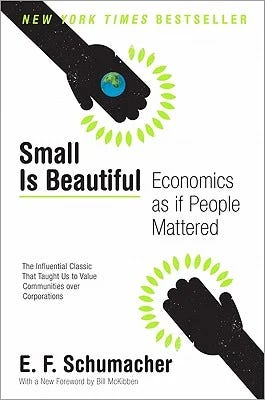If you pay attention to environmental activist groups like the Sunrise Movement or the Extinction Rebellion these days, you’re likely to hear a lot of talk about “growth” and “degrowth.”
This comes from the environmentalist diagnosis that climate change — as well as a dozen other ecological problems like ocean acidification, ocean plastification, air pollution, water scarcity, and so on — is caused by the modern capitalist economy’s reliance on growth to function. As writer Edward Abbey put it:
“Growth for the sake of growth is the ideology of the cancer cell.”
I’ve discussed the reasoning behind this a bit more in my discussion of the 1972 book The Limits to Growth (see article below), but once we’ve diagnosed the problem, it’s time to talk about the solutions! Which is why, today, we’re discussing E.F. Schumacher’s classic Small is Beautiful: Economics As If People Mattered.
Why capitalism won't stop climate change
One could reasonably take a glance around at what's going on in the world at the moment and think that we're maybe living through the early stages of the apocalypse. That's scary! And not at all exciting! But if fear is the mind killer, then curiosity is the fear killer. If we are to survive and even thrive in frightening times, we have to learn how to t…
Small is Beautiful
E.F. Schumacher was a German-born British economist who, while working in Burma, developed what he called “Buddhist Economics.” His system was also heavily inspired by the anarchist economic ideas of Mahatma Gandhi, and the environmental concerns that began to arise during the 60’s and 70’s. Small is Beautiful was the synthesis of his ideas.
His core argument was simple: the modern economy was unsustainable, because it was treating finite resources as if they were infinite, and if we wanted to reach a point of sustainability, we would have to build smaller, less consumption-based, decentralized economies that valued people over profits.
When I was arguing for anarchism on social media at one point, a friend of mine asked, “But I’ve never understood: how does anarchism scale?”
The answer, this book suggests, is that it doesn’t! Rather than trying to build out a giant, globalized, one-world-government style economy, we should be focusing on our grassroots and tending to our own communities.
The book also offers real world examples of ways companies and communities could organize themselves to be more democratic and decentralized, and the entire thing is worth reading, but if you don’t have time for the full book, you can get a taste by reading his essay “Buddhist Economics” (which is one of the chapters in the book) here.






